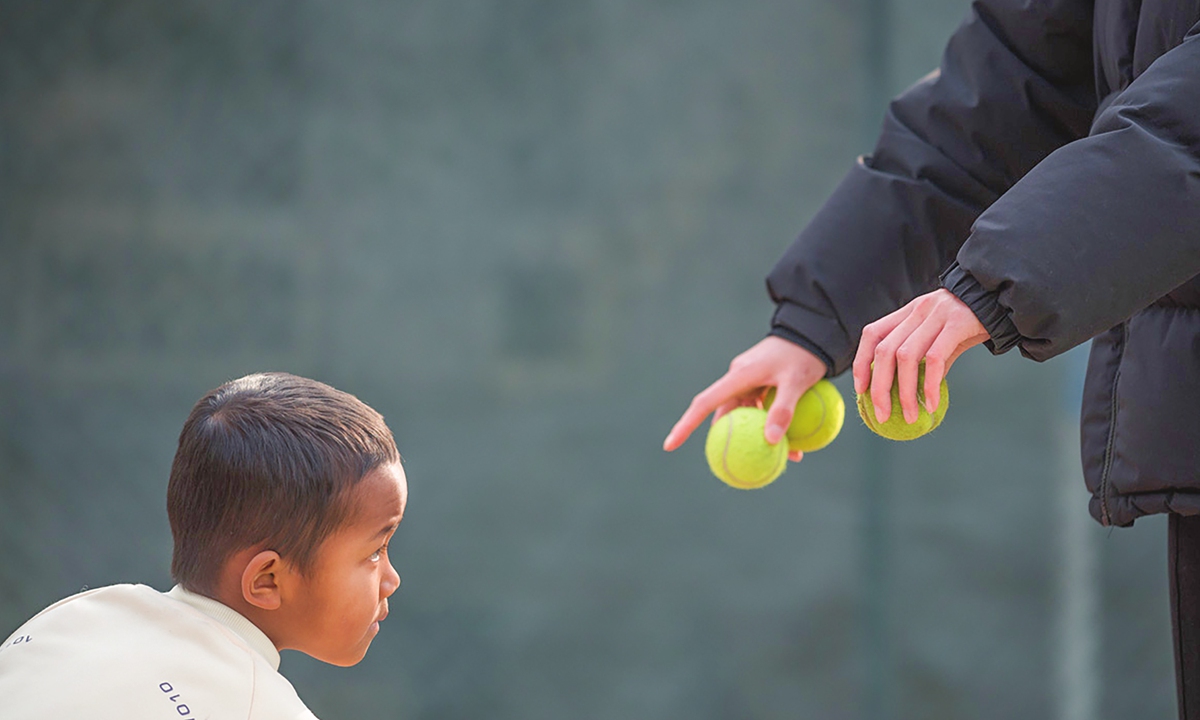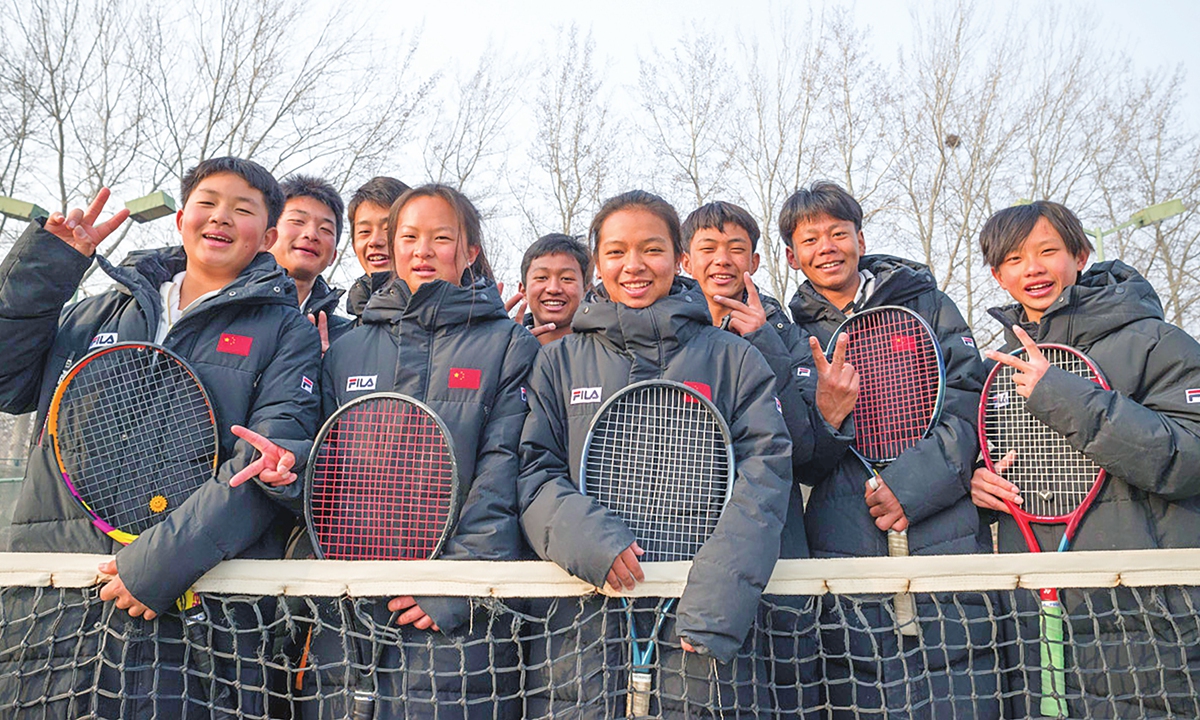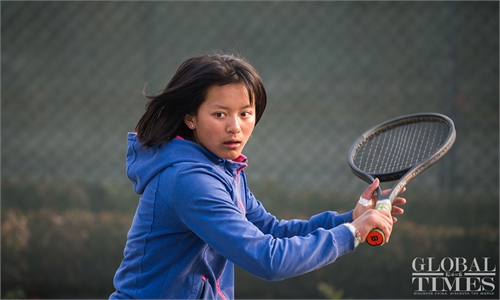SPORT / TENNIS
A robust troupe with national champions and a big warm family for ethnic minority kids

A young tennis player is training at the tennis court in Langfang, North China's Hebei Province. Photo: Chen Tao/GT

Young players from Wild Elephant Tennis Club take a photo at tennis court in Langfang, Hebei Province.Photo: Chen Tao/GT
It was 6:30 in the morning when the sky had just turned blue and the street lamps were still on. Despite the outdoor temperature of one degree, children from the Wild Elephant Tennis Club(Wild Elephant) had been practicing in front of the tennis wall for a while in Langfang, North China's Hebei Province.
Forehand and backhand, overhead smashes… these ethnic minority teenagers, from peasant families in the deep mountain villages in Southwest China's Yunnan Province were mostly selected for their athleticism, and were now sparing no effort in daily training to prepare for next national tennis match in 2025, guided by their coach/club founder Zhang Xiaohong.
To give a chance to those from poverty-stricken areas, Zhang established Wild Elephant in 2014 to teach children and take care of them, all with his own savings.
Despite winning more than 170 junior national tennis championships since 2014, it was not until the picture of Wild Elephant's Wang Fa went viral on social media last October that the team became known to the public.
The Global Times went to the Wild Elephant's main base in Langfang, to see the 15 teenage players and 14 freshly-selected children coming from eight of China's ethnic groups including Va, Dai, Hui, and Yi in the cities across Yunnan.
'A chance to change'
"My highest goal is to cultivate a world-level tennis player from these children," Zhang told the Global Times. "To do that, the 'little wild elephants,' some of whom have already possessed the capacity qualified for same-age-level international competitions, should take part in more competitions."
"Wang Fa's hit was unexpected to us. He is not the top player in our team, as 11 out of our 12 players selected in 2016 have won at least one national champion, especially the girls," said Zhang.
Back in 2020 when the COVID-19 pandemic hadn't affected yet much of the domestic games, girls from Wild Elephant occupied the first, second and third place of the CTJ-B800, the top level junior tennis match in China certificated by the Chinese Tennis Association.
Zhang hoped that they could be selected into the national youth or teenage team, which means more chances to participate in junior international tennis tournaments.
But the cost of attending overseas games was too high. Zhang said he was figuring out ways to raise money and talked with several enterprises in East China's Ningbo and Northwest China's Xi'an who showed willingness to sponsor them.
Zhang said he wished to give more ethnic minority children a chance to change their destiny through tennis and to boost the number of ethnic minority groups involved to over fifteen in the next two to three years.
With the support of the local sport authority in Langfang, Wild Elephant now had free tennis courts for training and dormitories.
The cost of participating in tennis matches in other Chinese cities is also covered by funds from the Langfang sport authority if they place in the top eight.
Zhang said the team is endeavoring in their training and practice amid China's unprecedented emphasis on youth sports.
The newly-revised sports law, the third chapter of which highlighted teenager and school sports, has come into effect from January 1 in 2023. China's first-ever National Student (Youth) Games will be held in South China's Guangxi Zhuang Autonomous Region in 2023 and the 15th National Game in 2025 will organize teenage groups in its events.
Zhang said that if they performed well in the national games or national student games, future overseas matches might not be a problem.
More than a sport team
Outside the tennis courts, Zhang is more like a father to the 29 children, eating and living with them and six other coaches.
To encourage children to work hard in training, besides various toys and picture books, Zhang bought a smart phone or a smart watch for each of the 29 kids. He hired instrument teachers, requiring students to be able to play at least one Chinese traditional instrument such as the bamboo flute, the cucurbit flute, the guzheng and the guqin.
Within his educational philosophy he tells the children to first be honest and decent people and then good tennis players.
It was 19:30 on an ordinary day and in the two-storey building 14 kids under the age of 10 were studying in a classroom on the second floor. The sound of bamboo flute performing "Bidding Farewell" came out of the girls' dormitory, mixed with the out-of-tune singing of the popular song "Chengdu." Several boys got out of the shower only with T-shirts and shorts on and then rushed to wear coats in case of catching cold.
Despite being nearly 3,000 kilometers away from their hometown, the "little wild elephants" live together just like a big family.

